E-Portfolio: Orientation for Success in Higher Education - 2021
VerifiedAdded on 2023/06/18
|12
|2442
|415
Portfolio
AI Summary
This E-portfolio demonstrates the knowledge and skills acquired from the 'Orientation for Success in Higher Education' module. It includes personal reflections and future implications of various learning areas, along with a SMART action plan for continuous growth. The portfolio covers reflective learning, the use of formative feedback, future implications, action plans, and a SWOT analysis. It showcases the impact of learning on future studies and careers, highlighting the development of research, time management, and teamwork skills. The SWOT analysis identifies strengths, weaknesses, opportunities, and threats, providing a comprehensive overview of the student's preparedness for higher education and future professional endeavors. Desklib is a valuable platform for students seeking similar resources, including past papers and solved assignments.
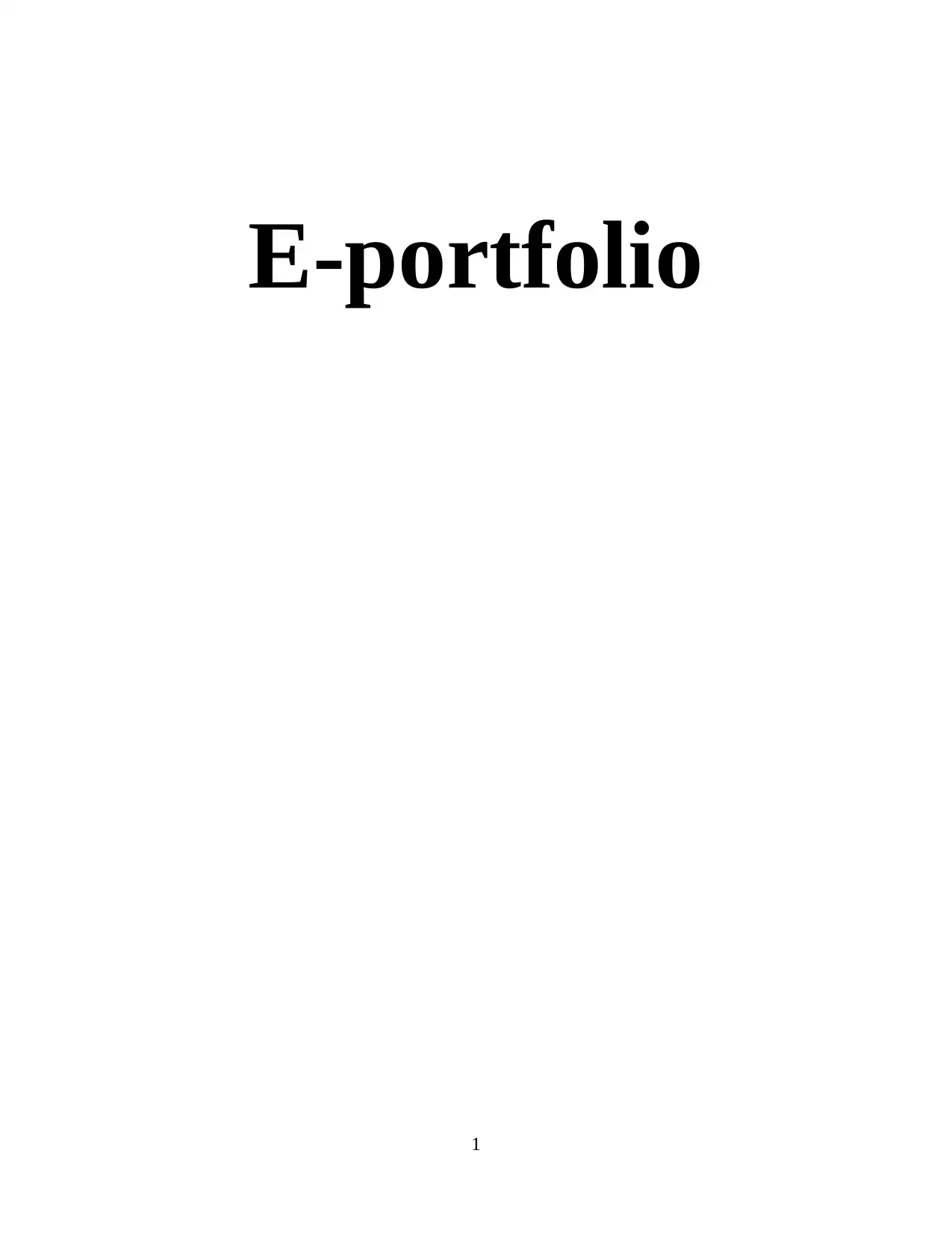
E-portfolio
1
1
Paraphrase This Document
Need a fresh take? Get an instant paraphrase of this document with our AI Paraphraser
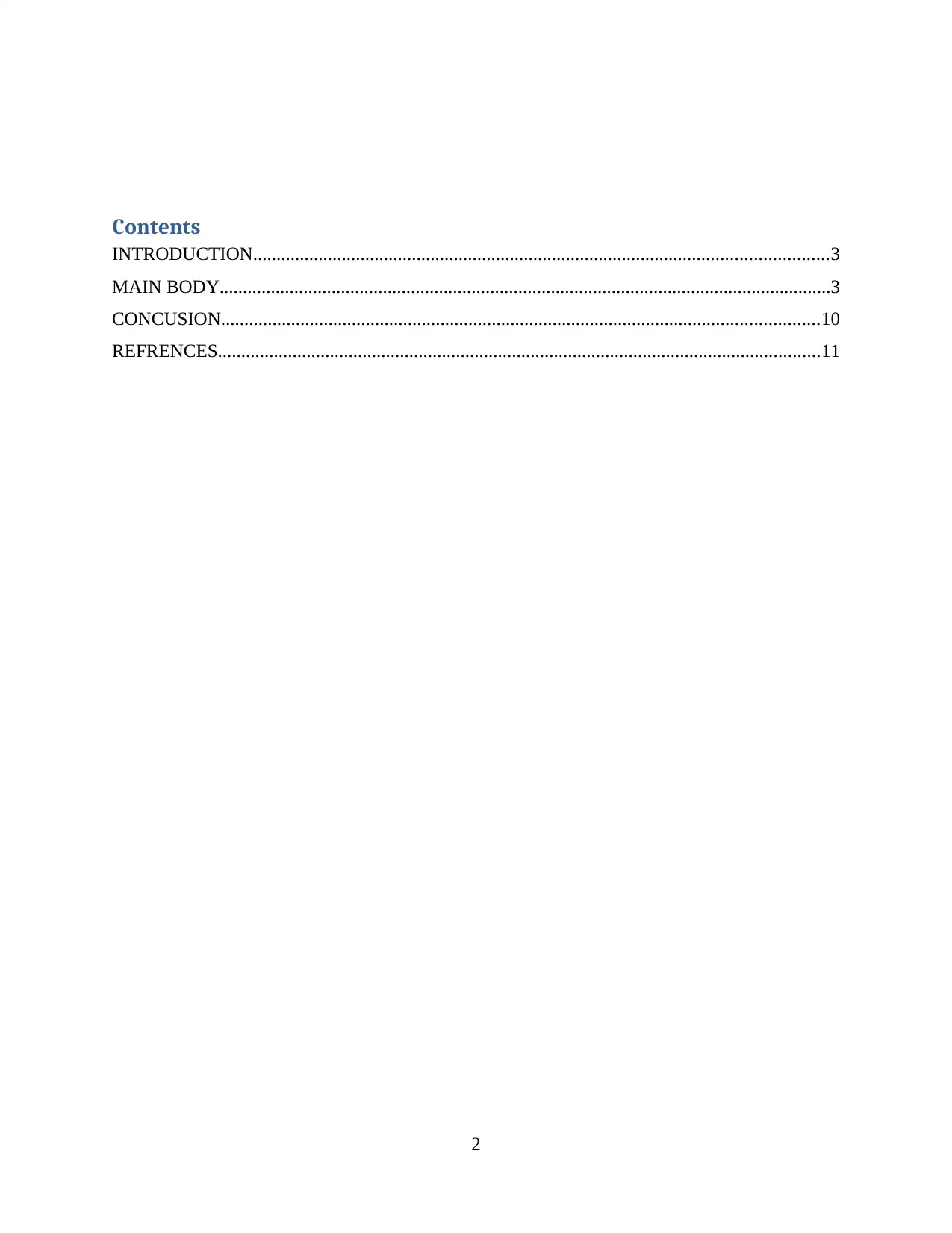
Contents
INTRODUCTION...........................................................................................................................3
MAIN BODY...................................................................................................................................3
CONCUSION................................................................................................................................10
REFRENCES.................................................................................................................................11
2
INTRODUCTION...........................................................................................................................3
MAIN BODY...................................................................................................................................3
CONCUSION................................................................................................................................10
REFRENCES.................................................................................................................................11
2
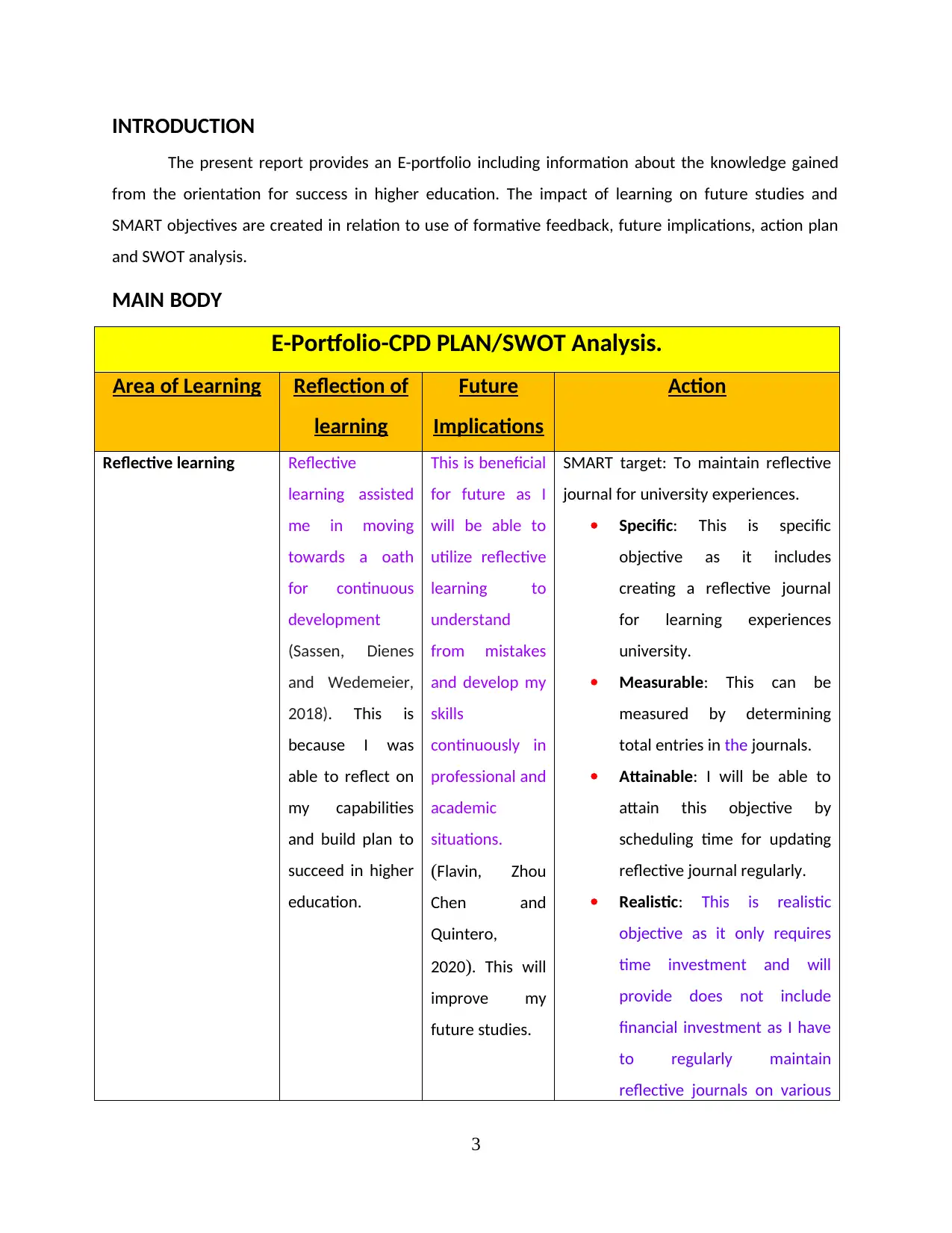
INTRODUCTION
The present report provides an E-portfolio including information about the knowledge gained
from the orientation for success in higher education. The impact of learning on future studies and
SMART objectives are created in relation to use of formative feedback, future implications, action plan
and SWOT analysis.
MAIN BODY
E-Portfolio-CPD PLAN/SWOT Analysis.
Area of Learning Reflection of
learning
Future
Implications
Action
Reflective learning Reflective
learning assisted
me in moving
towards a oath
for continuous
development
(Sassen, Dienes
and Wedemeier,
2018). This is
because I was
able to reflect on
my capabilities
and build plan to
succeed in higher
education.
This is beneficial
for future as I
will be able to
utilize reflective
learning to
understand
from mistakes
and develop my
skills
continuously in
professional and
academic
situations.
(Flavin, Zhou
Chen and
Quintero,
2020). This will
improve my
future studies.
SMART target: To maintain reflective
journal for university experiences.
Specific: This is specific
objective as it includes
creating a reflective journal
for learning experiences
university.
Measurable: This can be
measured by determining
total entries in the journals.
Attainable: I will be able to
attain this objective by
scheduling time for updating
reflective journal regularly.
Realistic: This is realistic
objective as it only requires
time investment and will
provide does not include
financial investment as I have
to regularly maintain
reflective journals on various
3
The present report provides an E-portfolio including information about the knowledge gained
from the orientation for success in higher education. The impact of learning on future studies and
SMART objectives are created in relation to use of formative feedback, future implications, action plan
and SWOT analysis.
MAIN BODY
E-Portfolio-CPD PLAN/SWOT Analysis.
Area of Learning Reflection of
learning
Future
Implications
Action
Reflective learning Reflective
learning assisted
me in moving
towards a oath
for continuous
development
(Sassen, Dienes
and Wedemeier,
2018). This is
because I was
able to reflect on
my capabilities
and build plan to
succeed in higher
education.
This is beneficial
for future as I
will be able to
utilize reflective
learning to
understand
from mistakes
and develop my
skills
continuously in
professional and
academic
situations.
(Flavin, Zhou
Chen and
Quintero,
2020). This will
improve my
future studies.
SMART target: To maintain reflective
journal for university experiences.
Specific: This is specific
objective as it includes
creating a reflective journal
for learning experiences
university.
Measurable: This can be
measured by determining
total entries in the journals.
Attainable: I will be able to
attain this objective by
scheduling time for updating
reflective journal regularly.
Realistic: This is realistic
objective as it only requires
time investment and will
provide does not include
financial investment as I have
to regularly maintain
reflective journals on various
3
⊘ This is a preview!⊘
Do you want full access?
Subscribe today to unlock all pages.

Trusted by 1+ million students worldwide
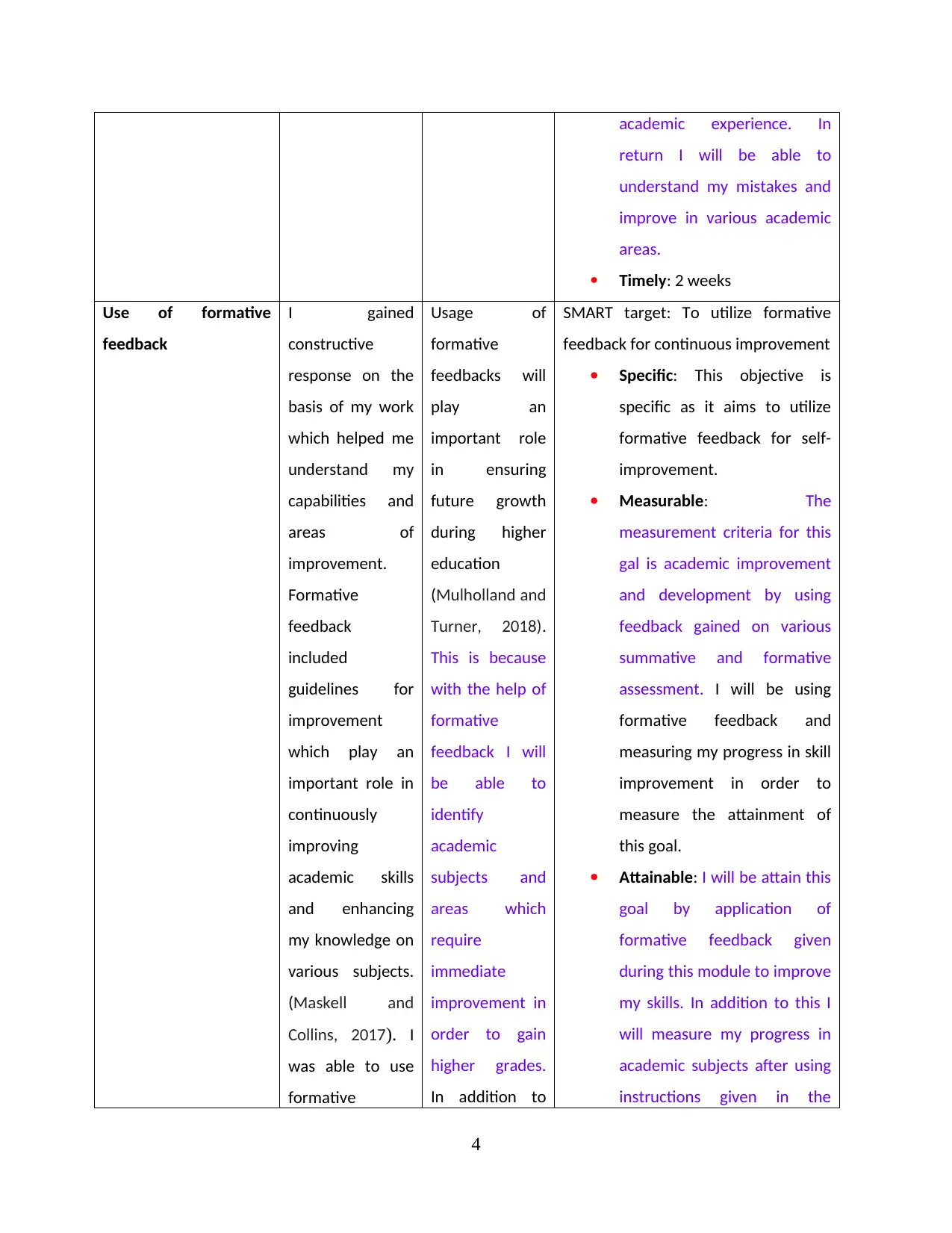
academic experience. In
return I will be able to
understand my mistakes and
improve in various academic
areas.
Timely: 2 weeks
Use of formative
feedback
I gained
constructive
response on the
basis of my work
which helped me
understand my
capabilities and
areas of
improvement.
Formative
feedback
included
guidelines for
improvement
which play an
important role in
continuously
improving
academic skills
and enhancing
my knowledge on
various subjects.
(Maskell and
Collins, 2017). I
was able to use
formative
Usage of
formative
feedbacks will
play an
important role
in ensuring
future growth
during higher
education
(Mulholland and
Turner, 2018).
This is because
with the help of
formative
feedback I will
be able to
identify
academic
subjects and
areas which
require
immediate
improvement in
order to gain
higher grades.
In addition to
SMART target: To utilize formative
feedback for continuous improvement
Specific: This objective is
specific as it aims to utilize
formative feedback for self-
improvement.
Measurable: The
measurement criteria for this
gal is academic improvement
and development by using
feedback gained on various
summative and formative
assessment. I will be using
formative feedback and
measuring my progress in skill
improvement in order to
measure the attainment of
this goal.
Attainable: I will be attain this
goal by application of
formative feedback given
during this module to improve
my skills. In addition to this I
will measure my progress in
academic subjects after using
instructions given in the
4
return I will be able to
understand my mistakes and
improve in various academic
areas.
Timely: 2 weeks
Use of formative
feedback
I gained
constructive
response on the
basis of my work
which helped me
understand my
capabilities and
areas of
improvement.
Formative
feedback
included
guidelines for
improvement
which play an
important role in
continuously
improving
academic skills
and enhancing
my knowledge on
various subjects.
(Maskell and
Collins, 2017). I
was able to use
formative
Usage of
formative
feedbacks will
play an
important role
in ensuring
future growth
during higher
education
(Mulholland and
Turner, 2018).
This is because
with the help of
formative
feedback I will
be able to
identify
academic
subjects and
areas which
require
immediate
improvement in
order to gain
higher grades.
In addition to
SMART target: To utilize formative
feedback for continuous improvement
Specific: This objective is
specific as it aims to utilize
formative feedback for self-
improvement.
Measurable: The
measurement criteria for this
gal is academic improvement
and development by using
feedback gained on various
summative and formative
assessment. I will be using
formative feedback and
measuring my progress in skill
improvement in order to
measure the attainment of
this goal.
Attainable: I will be attain this
goal by application of
formative feedback given
during this module to improve
my skills. In addition to this I
will measure my progress in
academic subjects after using
instructions given in the
4
Paraphrase This Document
Need a fresh take? Get an instant paraphrase of this document with our AI Paraphraser
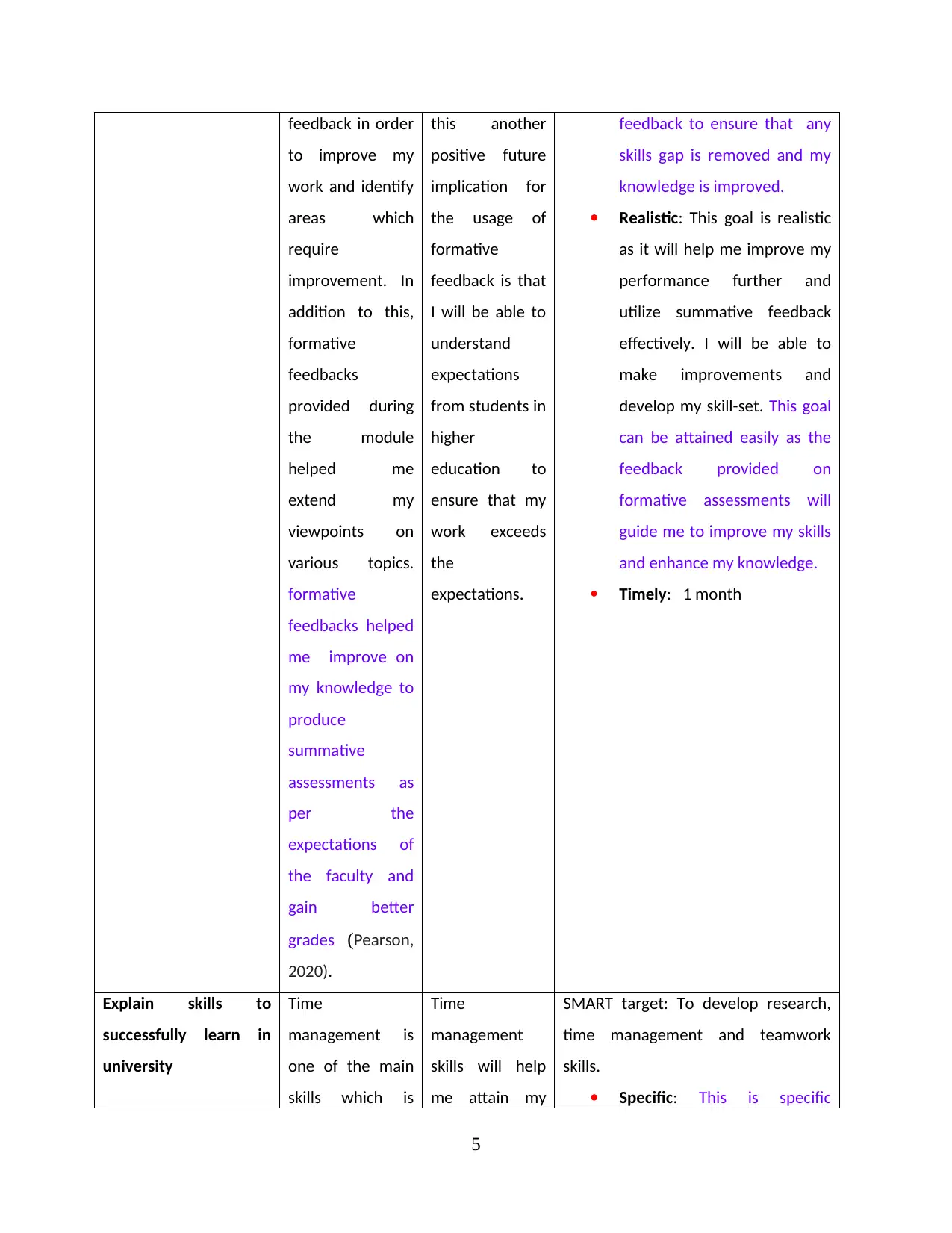
feedback in order
to improve my
work and identify
areas which
require
improvement. In
addition to this,
formative
feedbacks
provided during
the module
helped me
extend my
viewpoints on
various topics.
formative
feedbacks helped
me improve on
my knowledge to
produce
summative
assessments as
per the
expectations of
the faculty and
gain better
grades (Pearson,
2020).
this another
positive future
implication for
the usage of
formative
feedback is that
I will be able to
understand
expectations
from students in
higher
education to
ensure that my
work exceeds
the
expectations.
feedback to ensure that any
skills gap is removed and my
knowledge is improved.
Realistic: This goal is realistic
as it will help me improve my
performance further and
utilize summative feedback
effectively. I will be able to
make improvements and
develop my skill-set. This goal
can be attained easily as the
feedback provided on
formative assessments will
guide me to improve my skills
and enhance my knowledge.
Timely: 1 month
Explain skills to
successfully learn in
university
Time
management is
one of the main
skills which is
Time
management
skills will help
me attain my
SMART target: To develop research,
time management and teamwork
skills.
Specific: This is specific
5
to improve my
work and identify
areas which
require
improvement. In
addition to this,
formative
feedbacks
provided during
the module
helped me
extend my
viewpoints on
various topics.
formative
feedbacks helped
me improve on
my knowledge to
produce
summative
assessments as
per the
expectations of
the faculty and
gain better
grades (Pearson,
2020).
this another
positive future
implication for
the usage of
formative
feedback is that
I will be able to
understand
expectations
from students in
higher
education to
ensure that my
work exceeds
the
expectations.
feedback to ensure that any
skills gap is removed and my
knowledge is improved.
Realistic: This goal is realistic
as it will help me improve my
performance further and
utilize summative feedback
effectively. I will be able to
make improvements and
develop my skill-set. This goal
can be attained easily as the
feedback provided on
formative assessments will
guide me to improve my skills
and enhance my knowledge.
Timely: 1 month
Explain skills to
successfully learn in
university
Time
management is
one of the main
skills which is
Time
management
skills will help
me attain my
SMART target: To develop research,
time management and teamwork
skills.
Specific: This is specific
5
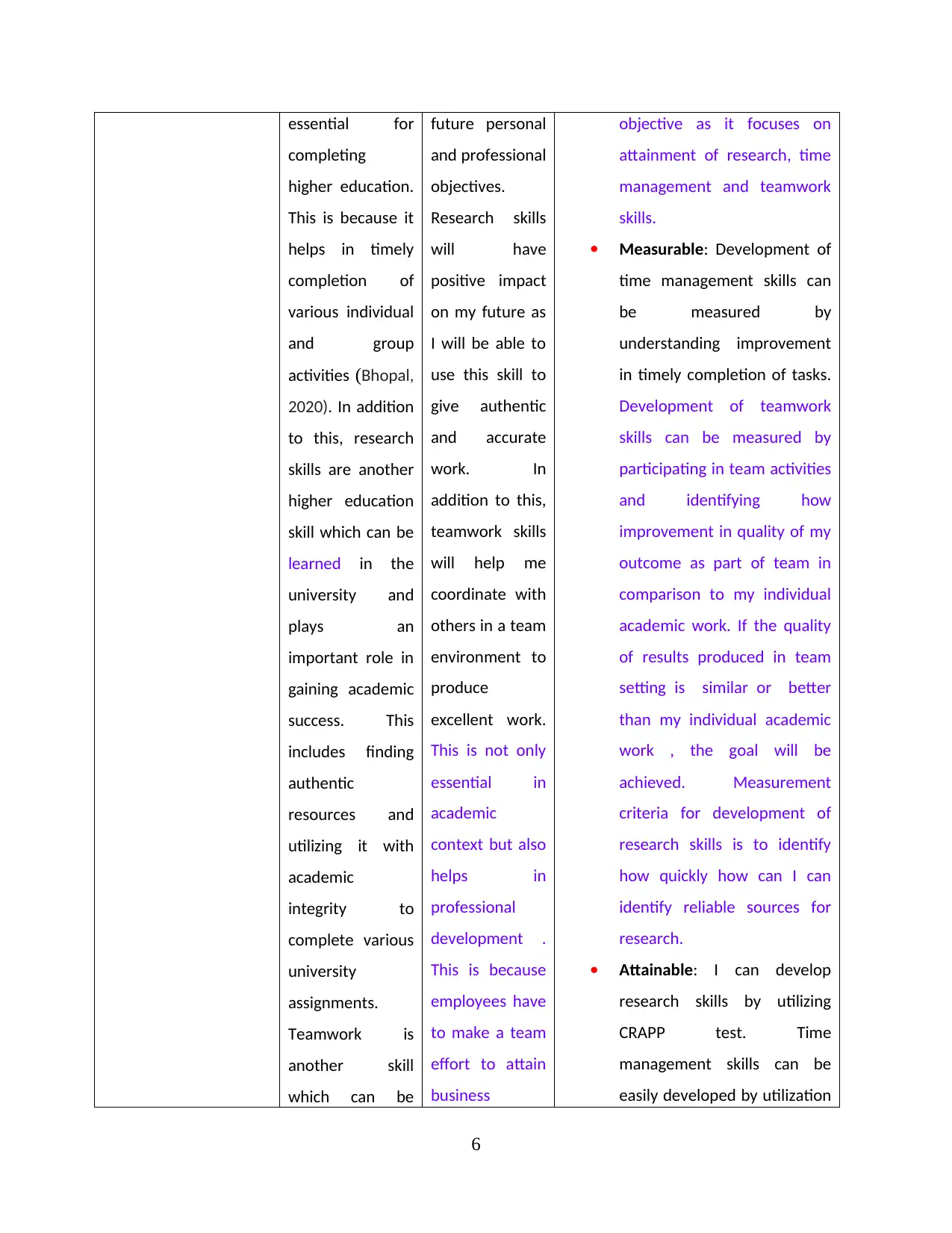
essential for
completing
higher education.
This is because it
helps in timely
completion of
various individual
and group
activities (Bhopal,
2020). In addition
to this, research
skills are another
higher education
skill which can be
learned in the
university and
plays an
important role in
gaining academic
success. This
includes finding
authentic
resources and
utilizing it with
academic
integrity to
complete various
university
assignments.
Teamwork is
another skill
which can be
future personal
and professional
objectives.
Research skills
will have
positive impact
on my future as
I will be able to
use this skill to
give authentic
and accurate
work. In
addition to this,
teamwork skills
will help me
coordinate with
others in a team
environment to
produce
excellent work.
This is not only
essential in
academic
context but also
helps in
professional
development .
This is because
employees have
to make a team
effort to attain
business
objective as it focuses on
attainment of research, time
management and teamwork
skills.
Measurable: Development of
time management skills can
be measured by
understanding improvement
in timely completion of tasks.
Development of teamwork
skills can be measured by
participating in team activities
and identifying how
improvement in quality of my
outcome as part of team in
comparison to my individual
academic work. If the quality
of results produced in team
setting is similar or better
than my individual academic
work , the goal will be
achieved. Measurement
criteria for development of
research skills is to identify
how quickly how can I can
identify reliable sources for
research.
Attainable: I can develop
research skills by utilizing
CRAPP test. Time
management skills can be
easily developed by utilization
6
completing
higher education.
This is because it
helps in timely
completion of
various individual
and group
activities (Bhopal,
2020). In addition
to this, research
skills are another
higher education
skill which can be
learned in the
university and
plays an
important role in
gaining academic
success. This
includes finding
authentic
resources and
utilizing it with
academic
integrity to
complete various
university
assignments.
Teamwork is
another skill
which can be
future personal
and professional
objectives.
Research skills
will have
positive impact
on my future as
I will be able to
use this skill to
give authentic
and accurate
work. In
addition to this,
teamwork skills
will help me
coordinate with
others in a team
environment to
produce
excellent work.
This is not only
essential in
academic
context but also
helps in
professional
development .
This is because
employees have
to make a team
effort to attain
business
objective as it focuses on
attainment of research, time
management and teamwork
skills.
Measurable: Development of
time management skills can
be measured by
understanding improvement
in timely completion of tasks.
Development of teamwork
skills can be measured by
participating in team activities
and identifying how
improvement in quality of my
outcome as part of team in
comparison to my individual
academic work. If the quality
of results produced in team
setting is similar or better
than my individual academic
work , the goal will be
achieved. Measurement
criteria for development of
research skills is to identify
how quickly how can I can
identify reliable sources for
research.
Attainable: I can develop
research skills by utilizing
CRAPP test. Time
management skills can be
easily developed by utilization
6
⊘ This is a preview!⊘
Do you want full access?
Subscribe today to unlock all pages.

Trusted by 1+ million students worldwide
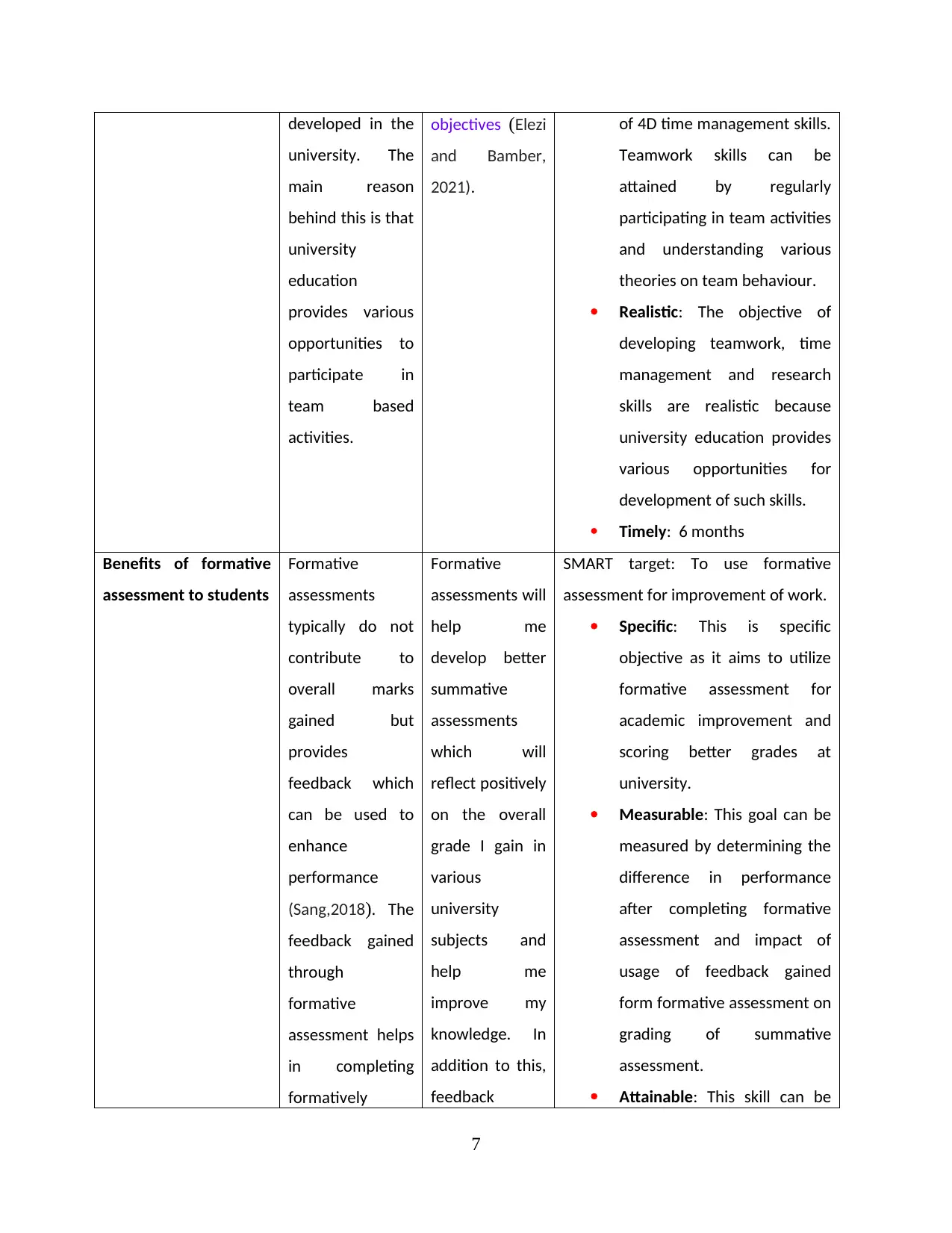
developed in the
university. The
main reason
behind this is that
university
education
provides various
opportunities to
participate in
team based
activities.
objectives (Elezi
and Bamber,
2021).
of 4D time management skills.
Teamwork skills can be
attained by regularly
participating in team activities
and understanding various
theories on team behaviour.
Realistic: The objective of
developing teamwork, time
management and research
skills are realistic because
university education provides
various opportunities for
development of such skills.
Timely: 6 months
Benefits of formative
assessment to students
Formative
assessments
typically do not
contribute to
overall marks
gained but
provides
feedback which
can be used to
enhance
performance
(Sang,2018). The
feedback gained
through
formative
assessment helps
in completing
formatively
Formative
assessments will
help me
develop better
summative
assessments
which will
reflect positively
on the overall
grade I gain in
various
university
subjects and
help me
improve my
knowledge. In
addition to this,
feedback
SMART target: To use formative
assessment for improvement of work.
Specific: This is specific
objective as it aims to utilize
formative assessment for
academic improvement and
scoring better grades at
university.
Measurable: This goal can be
measured by determining the
difference in performance
after completing formative
assessment and impact of
usage of feedback gained
form formative assessment on
grading of summative
assessment.
Attainable: This skill can be
7
university. The
main reason
behind this is that
university
education
provides various
opportunities to
participate in
team based
activities.
objectives (Elezi
and Bamber,
2021).
of 4D time management skills.
Teamwork skills can be
attained by regularly
participating in team activities
and understanding various
theories on team behaviour.
Realistic: The objective of
developing teamwork, time
management and research
skills are realistic because
university education provides
various opportunities for
development of such skills.
Timely: 6 months
Benefits of formative
assessment to students
Formative
assessments
typically do not
contribute to
overall marks
gained but
provides
feedback which
can be used to
enhance
performance
(Sang,2018). The
feedback gained
through
formative
assessment helps
in completing
formatively
Formative
assessments will
help me
develop better
summative
assessments
which will
reflect positively
on the overall
grade I gain in
various
university
subjects and
help me
improve my
knowledge. In
addition to this,
feedback
SMART target: To use formative
assessment for improvement of work.
Specific: This is specific
objective as it aims to utilize
formative assessment for
academic improvement and
scoring better grades at
university.
Measurable: This goal can be
measured by determining the
difference in performance
after completing formative
assessment and impact of
usage of feedback gained
form formative assessment on
grading of summative
assessment.
Attainable: This skill can be
7
Paraphrase This Document
Need a fresh take? Get an instant paraphrase of this document with our AI Paraphraser
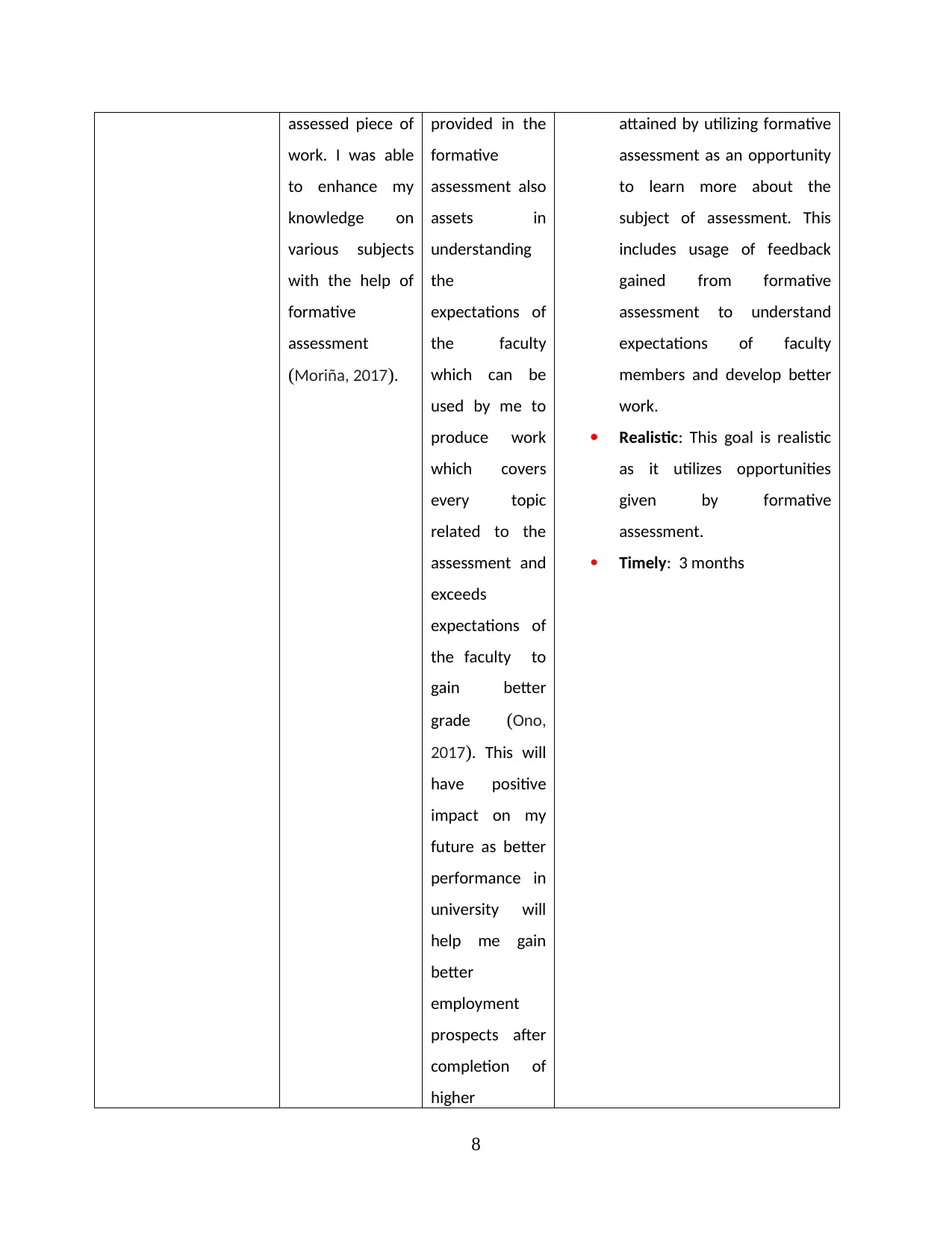
assessed piece of
work. I was able
to enhance my
knowledge on
various subjects
with the help of
formative
assessment
(Moriña, 2017).
provided in the
formative
assessment also
assets in
understanding
the
expectations of
the faculty
which can be
used by me to
produce work
which covers
every topic
related to the
assessment and
exceeds
expectations of
the faculty to
gain better
grade (Ono,
2017). This will
have positive
impact on my
future as better
performance in
university will
help me gain
better
employment
prospects after
completion of
higher
attained by utilizing formative
assessment as an opportunity
to learn more about the
subject of assessment. This
includes usage of feedback
gained from formative
assessment to understand
expectations of faculty
members and develop better
work.
Realistic: This goal is realistic
as it utilizes opportunities
given by formative
assessment.
Timely: 3 months
8
work. I was able
to enhance my
knowledge on
various subjects
with the help of
formative
assessment
(Moriña, 2017).
provided in the
formative
assessment also
assets in
understanding
the
expectations of
the faculty
which can be
used by me to
produce work
which covers
every topic
related to the
assessment and
exceeds
expectations of
the faculty to
gain better
grade (Ono,
2017). This will
have positive
impact on my
future as better
performance in
university will
help me gain
better
employment
prospects after
completion of
higher
attained by utilizing formative
assessment as an opportunity
to learn more about the
subject of assessment. This
includes usage of feedback
gained from formative
assessment to understand
expectations of faculty
members and develop better
work.
Realistic: This goal is realistic
as it utilizes opportunities
given by formative
assessment.
Timely: 3 months
8
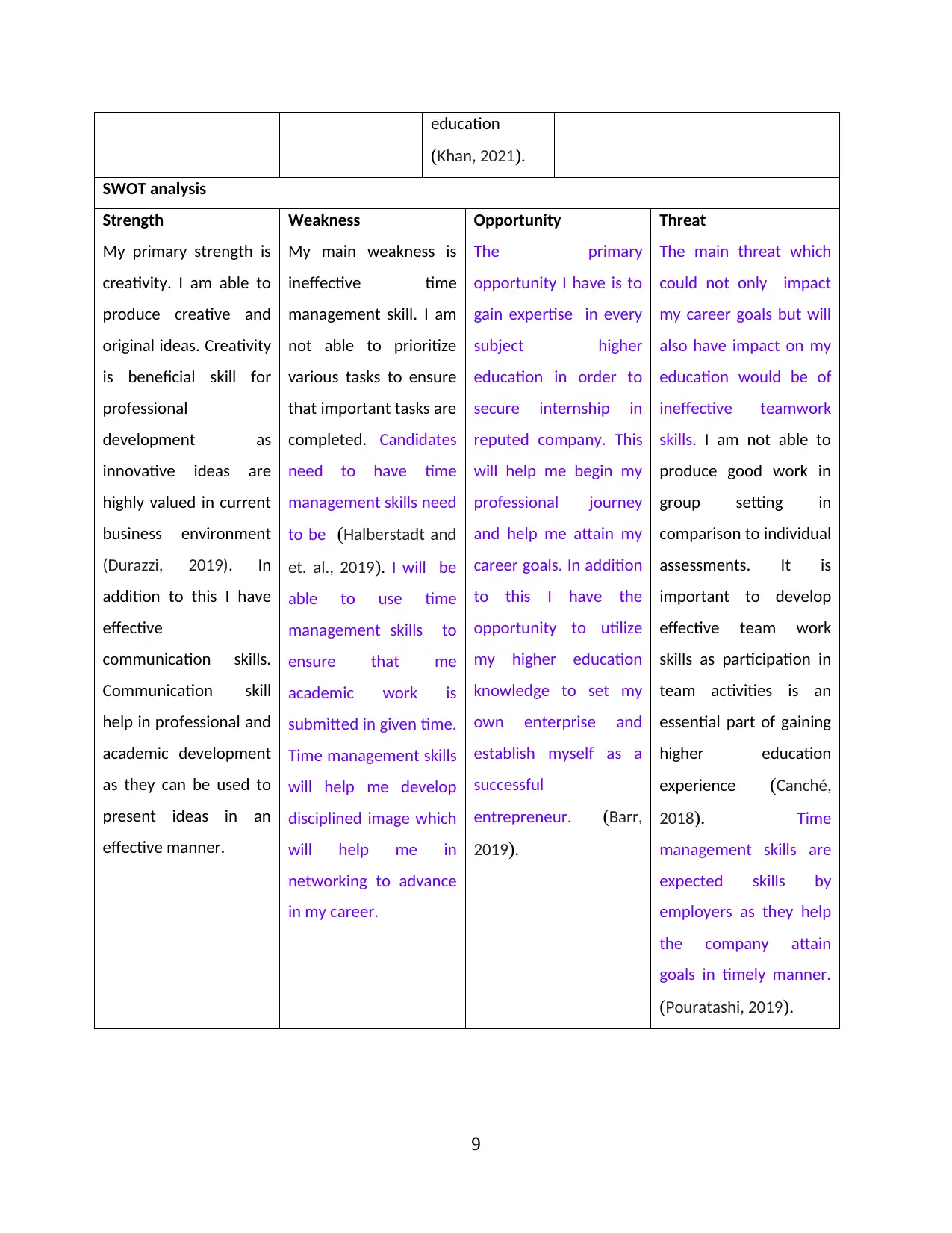
education
(Khan, 2021).
SWOT analysis
Strength Weakness Opportunity Threat
My primary strength is
creativity. I am able to
produce creative and
original ideas. Creativity
is beneficial skill for
professional
development as
innovative ideas are
highly valued in current
business environment
(Durazzi, 2019). In
addition to this I have
effective
communication skills.
Communication skill
help in professional and
academic development
as they can be used to
present ideas in an
effective manner.
My main weakness is
ineffective time
management skill. I am
not able to prioritize
various tasks to ensure
that important tasks are
completed. Candidates
need to have time
management skills need
to be (Halberstadt and
et. al., 2019). I will be
able to use time
management skills to
ensure that me
academic work is
submitted in given time.
Time management skills
will help me develop
disciplined image which
will help me in
networking to advance
in my career.
The primary
opportunity I have is to
gain expertise in every
subject higher
education in order to
secure internship in
reputed company. This
will help me begin my
professional journey
and help me attain my
career goals. In addition
to this I have the
opportunity to utilize
my higher education
knowledge to set my
own enterprise and
establish myself as a
successful
entrepreneur. (Barr,
2019).
The main threat which
could not only impact
my career goals but will
also have impact on my
education would be of
ineffective teamwork
skills. I am not able to
produce good work in
group setting in
comparison to individual
assessments. It is
important to develop
effective team work
skills as participation in
team activities is an
essential part of gaining
higher education
experience (Canché,
2018). Time
management skills are
expected skills by
employers as they help
the company attain
goals in timely manner.
(Pouratashi, 2019).
9
(Khan, 2021).
SWOT analysis
Strength Weakness Opportunity Threat
My primary strength is
creativity. I am able to
produce creative and
original ideas. Creativity
is beneficial skill for
professional
development as
innovative ideas are
highly valued in current
business environment
(Durazzi, 2019). In
addition to this I have
effective
communication skills.
Communication skill
help in professional and
academic development
as they can be used to
present ideas in an
effective manner.
My main weakness is
ineffective time
management skill. I am
not able to prioritize
various tasks to ensure
that important tasks are
completed. Candidates
need to have time
management skills need
to be (Halberstadt and
et. al., 2019). I will be
able to use time
management skills to
ensure that me
academic work is
submitted in given time.
Time management skills
will help me develop
disciplined image which
will help me in
networking to advance
in my career.
The primary
opportunity I have is to
gain expertise in every
subject higher
education in order to
secure internship in
reputed company. This
will help me begin my
professional journey
and help me attain my
career goals. In addition
to this I have the
opportunity to utilize
my higher education
knowledge to set my
own enterprise and
establish myself as a
successful
entrepreneur. (Barr,
2019).
The main threat which
could not only impact
my career goals but will
also have impact on my
education would be of
ineffective teamwork
skills. I am not able to
produce good work in
group setting in
comparison to individual
assessments. It is
important to develop
effective team work
skills as participation in
team activities is an
essential part of gaining
higher education
experience (Canché,
2018). Time
management skills are
expected skills by
employers as they help
the company attain
goals in timely manner.
(Pouratashi, 2019).
9
⊘ This is a preview!⊘
Do you want full access?
Subscribe today to unlock all pages.

Trusted by 1+ million students worldwide
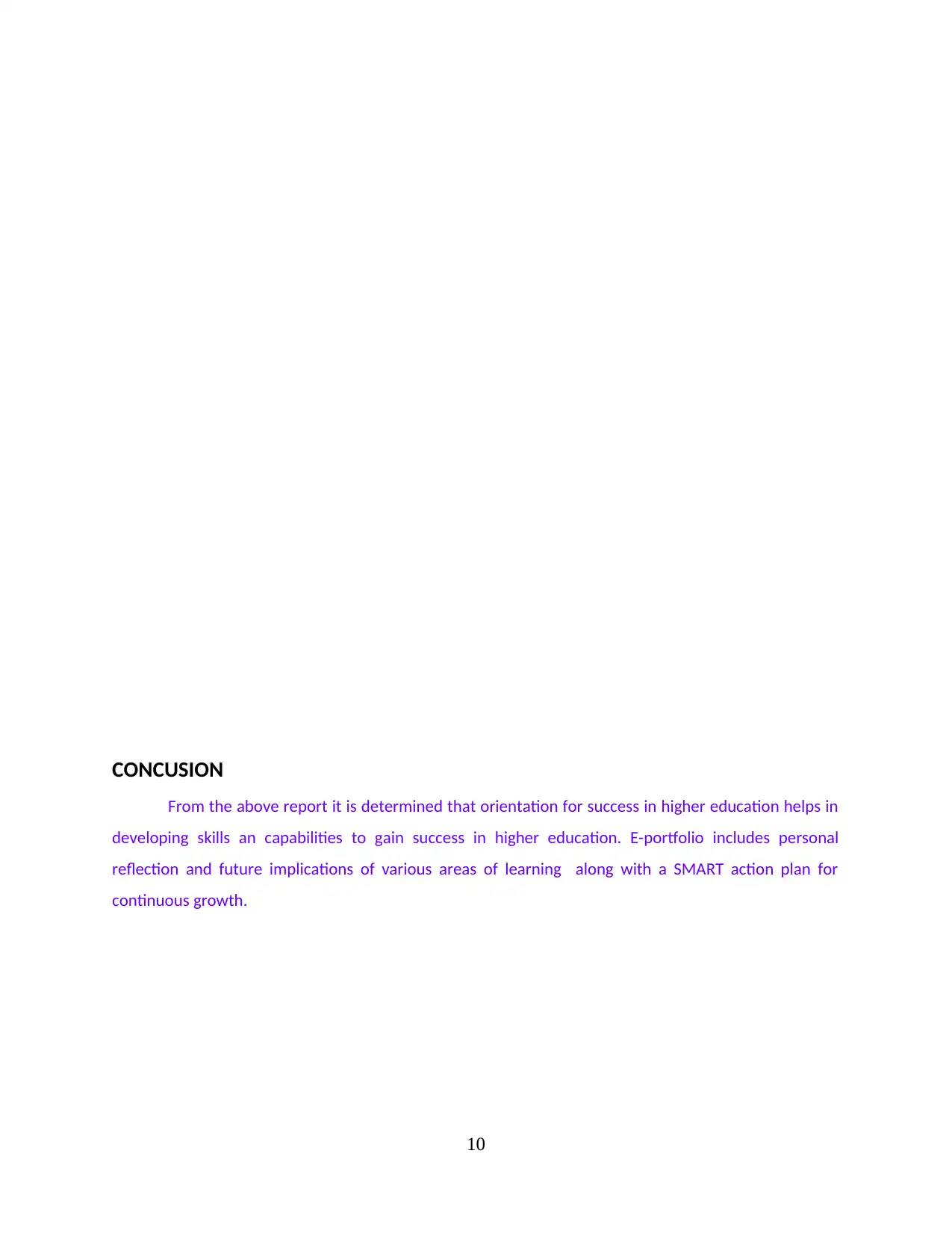
CONCUSION
From the above report it is determined that orientation for success in higher education helps in
developing skills an capabilities to gain success in higher education. E-portfolio includes personal
reflection and future implications of various areas of learning along with a SMART action plan for
continuous growth.
10
From the above report it is determined that orientation for success in higher education helps in
developing skills an capabilities to gain success in higher education. E-portfolio includes personal
reflection and future implications of various areas of learning along with a SMART action plan for
continuous growth.
10
Paraphrase This Document
Need a fresh take? Get an instant paraphrase of this document with our AI Paraphraser
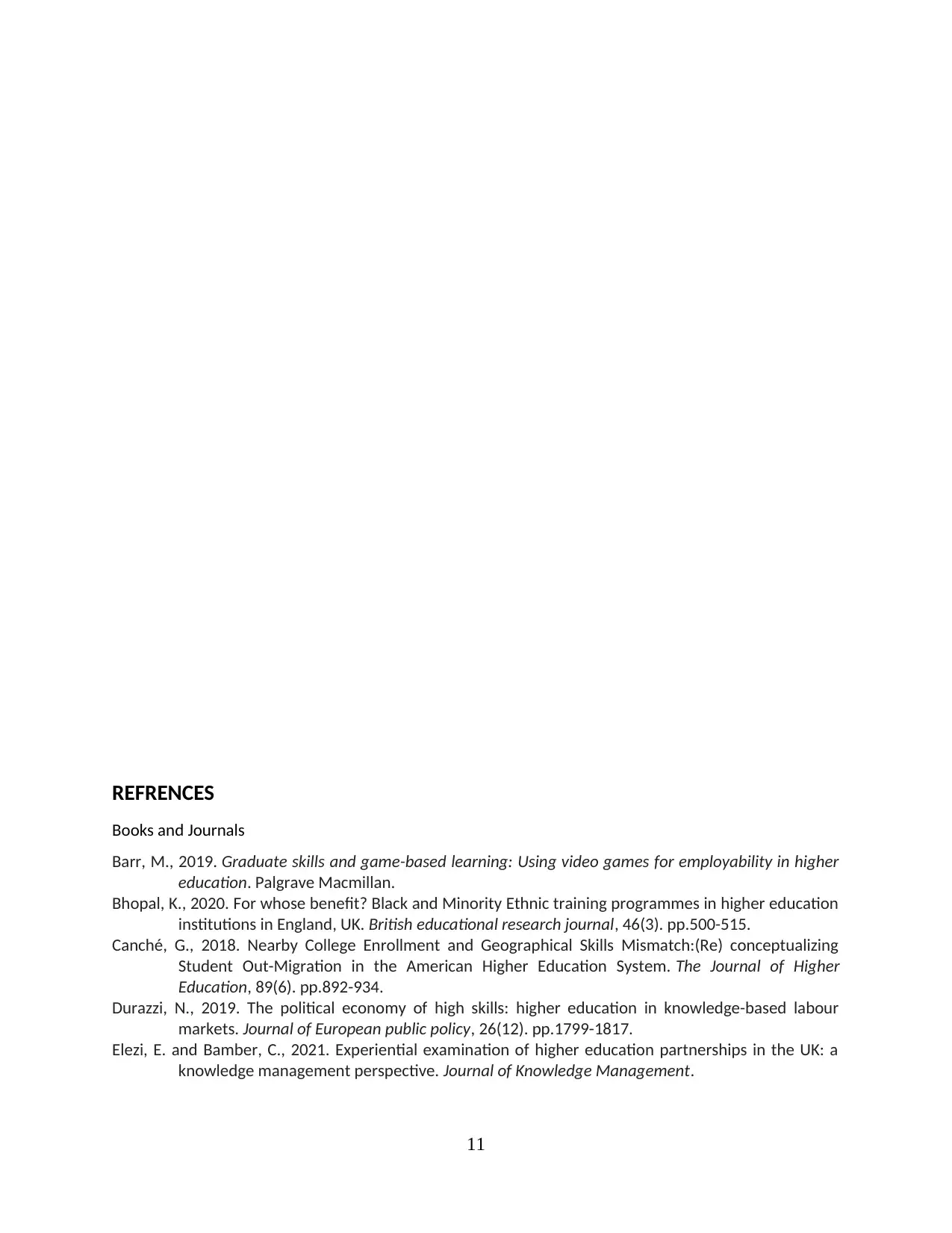
REFRENCES
Books and Journals
Barr, M., 2019. Graduate skills and game-based learning: Using video games for employability in higher
education. Palgrave Macmillan.
Bhopal, K., 2020. For whose benefit? Black and Minority Ethnic training programmes in higher education
institutions in England, UK. British educational research journal, 46(3). pp.500-515.
Canché, G., 2018. Nearby College Enrollment and Geographical Skills Mismatch:(Re) conceptualizing
Student Out-Migration in the American Higher Education System. The Journal of Higher
Education, 89(6). pp.892-934.
Durazzi, N., 2019. The political economy of high skills: higher education in knowledge-based labour
markets. Journal of European public policy, 26(12). pp.1799-1817.
Elezi, E. and Bamber, C., 2021. Experiential examination of higher education partnerships in the UK: a
knowledge management perspective. Journal of Knowledge Management.
11
Books and Journals
Barr, M., 2019. Graduate skills and game-based learning: Using video games for employability in higher
education. Palgrave Macmillan.
Bhopal, K., 2020. For whose benefit? Black and Minority Ethnic training programmes in higher education
institutions in England, UK. British educational research journal, 46(3). pp.500-515.
Canché, G., 2018. Nearby College Enrollment and Geographical Skills Mismatch:(Re) conceptualizing
Student Out-Migration in the American Higher Education System. The Journal of Higher
Education, 89(6). pp.892-934.
Durazzi, N., 2019. The political economy of high skills: higher education in knowledge-based labour
markets. Journal of European public policy, 26(12). pp.1799-1817.
Elezi, E. and Bamber, C., 2021. Experiential examination of higher education partnerships in the UK: a
knowledge management perspective. Journal of Knowledge Management.
11
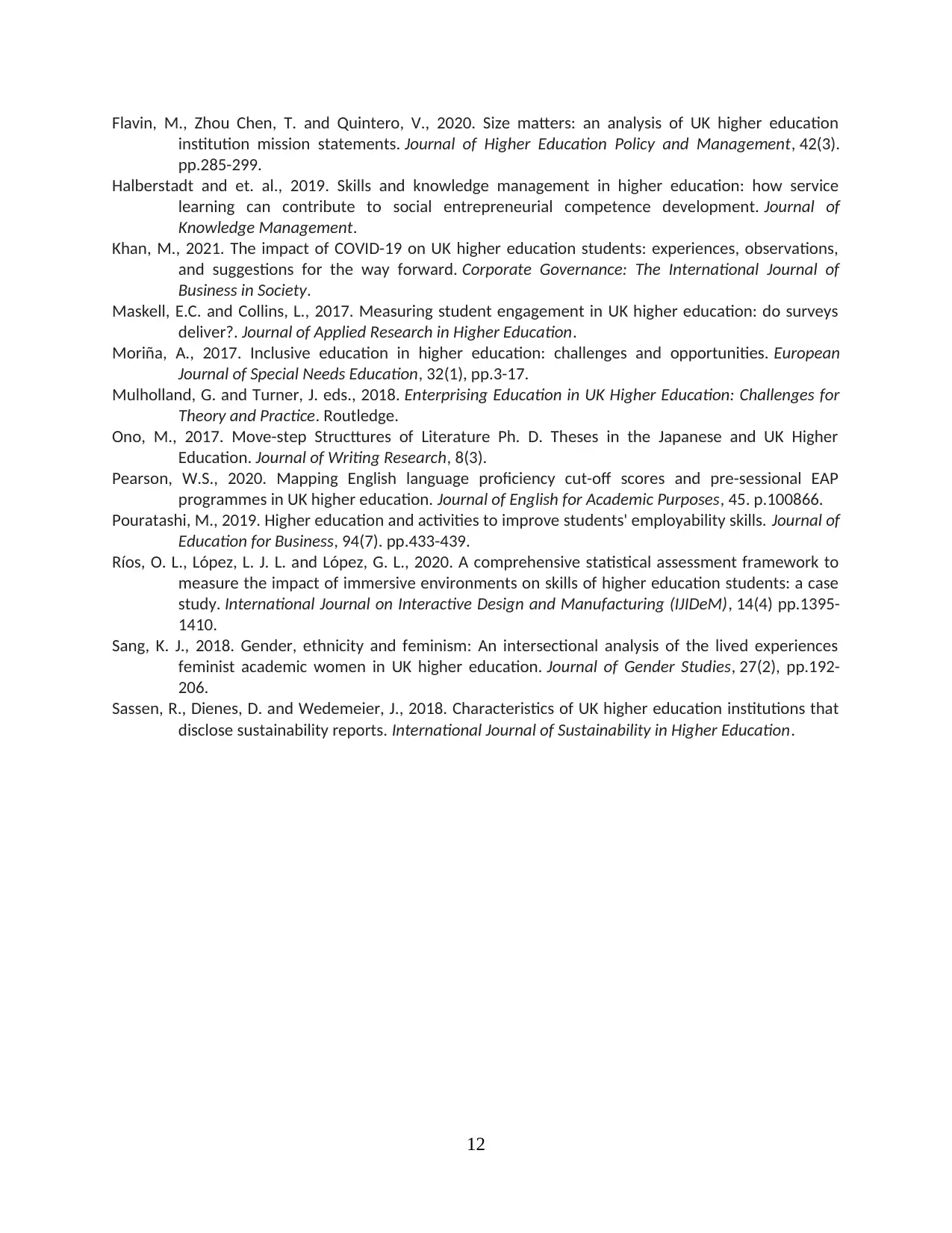
Flavin, M., Zhou Chen, T. and Quintero, V., 2020. Size matters: an analysis of UK higher education
institution mission statements. Journal of Higher Education Policy and Management, 42(3).
pp.285-299.
Halberstadt and et. al., 2019. Skills and knowledge management in higher education: how service
learning can contribute to social entrepreneurial competence development. Journal of
Knowledge Management.
Khan, M., 2021. The impact of COVID-19 on UK higher education students: experiences, observations,
and suggestions for the way forward. Corporate Governance: The International Journal of
Business in Society.
Maskell, E.C. and Collins, L., 2017. Measuring student engagement in UK higher education: do surveys
deliver?. Journal of Applied Research in Higher Education.
Moriña, A., 2017. Inclusive education in higher education: challenges and opportunities. European
Journal of Special Needs Education, 32(1), pp.3-17.
Mulholland, G. and Turner, J. eds., 2018. Enterprising Education in UK Higher Education: Challenges for
Theory and Practice. Routledge.
Ono, M., 2017. Move-step Structtures of Literature Ph. D. Theses in the Japanese and UK Higher
Education. Journal of Writing Research, 8(3).
Pearson, W.S., 2020. Mapping English language proficiency cut-off scores and pre-sessional EAP
programmes in UK higher education. Journal of English for Academic Purposes, 45. p.100866.
Pouratashi, M., 2019. Higher education and activities to improve students' employability skills. Journal of
Education for Business, 94(7). pp.433-439.
Ríos, O. L., López, L. J. L. and López, G. L., 2020. A comprehensive statistical assessment framework to
measure the impact of immersive environments on skills of higher education students: a case
study. International Journal on Interactive Design and Manufacturing (IJIDeM), 14(4) pp.1395-
1410.
Sang, K. J., 2018. Gender, ethnicity and feminism: An intersectional analysis of the lived experiences
feminist academic women in UK higher education. Journal of Gender Studies, 27(2), pp.192-
206.
Sassen, R., Dienes, D. and Wedemeier, J., 2018. Characteristics of UK higher education institutions that
disclose sustainability reports. International Journal of Sustainability in Higher Education.
12
institution mission statements. Journal of Higher Education Policy and Management, 42(3).
pp.285-299.
Halberstadt and et. al., 2019. Skills and knowledge management in higher education: how service
learning can contribute to social entrepreneurial competence development. Journal of
Knowledge Management.
Khan, M., 2021. The impact of COVID-19 on UK higher education students: experiences, observations,
and suggestions for the way forward. Corporate Governance: The International Journal of
Business in Society.
Maskell, E.C. and Collins, L., 2017. Measuring student engagement in UK higher education: do surveys
deliver?. Journal of Applied Research in Higher Education.
Moriña, A., 2017. Inclusive education in higher education: challenges and opportunities. European
Journal of Special Needs Education, 32(1), pp.3-17.
Mulholland, G. and Turner, J. eds., 2018. Enterprising Education in UK Higher Education: Challenges for
Theory and Practice. Routledge.
Ono, M., 2017. Move-step Structtures of Literature Ph. D. Theses in the Japanese and UK Higher
Education. Journal of Writing Research, 8(3).
Pearson, W.S., 2020. Mapping English language proficiency cut-off scores and pre-sessional EAP
programmes in UK higher education. Journal of English for Academic Purposes, 45. p.100866.
Pouratashi, M., 2019. Higher education and activities to improve students' employability skills. Journal of
Education for Business, 94(7). pp.433-439.
Ríos, O. L., López, L. J. L. and López, G. L., 2020. A comprehensive statistical assessment framework to
measure the impact of immersive environments on skills of higher education students: a case
study. International Journal on Interactive Design and Manufacturing (IJIDeM), 14(4) pp.1395-
1410.
Sang, K. J., 2018. Gender, ethnicity and feminism: An intersectional analysis of the lived experiences
feminist academic women in UK higher education. Journal of Gender Studies, 27(2), pp.192-
206.
Sassen, R., Dienes, D. and Wedemeier, J., 2018. Characteristics of UK higher education institutions that
disclose sustainability reports. International Journal of Sustainability in Higher Education.
12
⊘ This is a preview!⊘
Do you want full access?
Subscribe today to unlock all pages.

Trusted by 1+ million students worldwide
1 out of 12
Related Documents
Your All-in-One AI-Powered Toolkit for Academic Success.
+13062052269
info@desklib.com
Available 24*7 on WhatsApp / Email
![[object Object]](/_next/static/media/star-bottom.7253800d.svg)
Unlock your academic potential
Copyright © 2020–2026 A2Z Services. All Rights Reserved. Developed and managed by ZUCOL.





